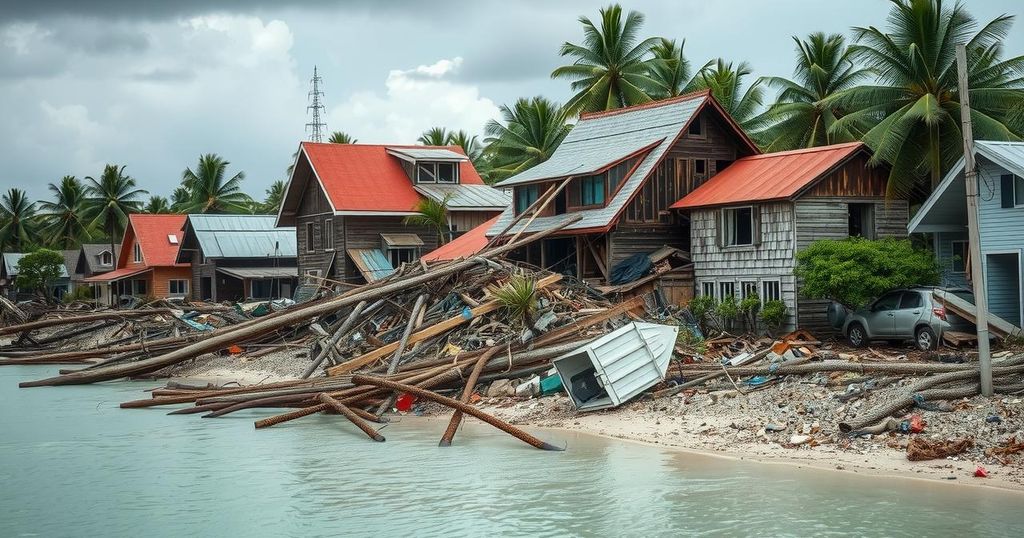Cyclone Chido has devastated Mayotte, leading to widespread destruction and severe humanitarian crises. With over 225 km/h winds and significant structural damage, residents face dire shortages of food and water. The confirmed death toll stands at 20, with predictions it could reach hundreds, complicated by a large population of undocumented migrants. Rescue efforts are ongoing, but infrastructure challenges hinder emergency response.
In the wake of Cyclone Chido, Mayotte is grappling with unprecedented devastation, described by residents as eerily reminiscent of a nuclear disaster. With wind speeds exceeding 225 km/h (140 mph), the cyclone wreaked havoc primarily in impoverished areas. Immediate concerns include the lack of potable water and food shortages, exacerbated by the cyclone’s damage to infrastructure. Reports indicate that the confirmed death toll stands at 20, but local authorities caution it could rise into the hundreds or thousands due to the significant number of undocumented migrants in the territory, complicating rescue efforts. Rescue operations, supported by French military personnel, are underway amidst widespread disruption in essential services such as power and water supply.
Residents lament the dire situation, with many expressing their feelings of abandonment. “We feel completely abandoned, and we don’t even know if help is coming,” stated Amalia Mazon, a midwife from Brussels. Health services have severely deteriorated, as expressed by French health minister Geneviève Darrieussecq, noting that the healthcare system in the archipelago has experienced degradation from the storm’s impact. Emergency responders continue to sift through the debris in search of survivors, while aid has started to trickle in, albeit insufficiently in the face of overwhelming need.
Cyclone Chido, which later impacted Mozambique, has been attributed to the long hovering over warm ocean waters, made more potent by changing climate patterns. Experts predict that it will continue to deposit substantial rainfall as it moves across southern Africa. As reported by UNICEF, the cyclone’s impact raises concerns over potential public health crises, particularly the risk of waterborne diseases following the loss of clean water facilities. The full ramifications of this disaster are still unfolding, as authorities grapple with the combined challenges of rescue and recovery in this French territory.
Cyclone Chido is recognized as one of the most destructive storms to strike Mayotte in the last nine decades. The cyclone not only resulted in significant structural damage but also brought severe humanitarian crises to the fore, particularly affecting the most vulnerable populations such as undocumented migrants and impoverished residents. Mayotte, an overseas territory of France, has a troubled history of poverty and reliance on governmental aid, which complicates recovery efforts following the cyclone. Moreover, the health systems, reliant on external support, are now strained due to the emergency situation created by the cyclone. With a considerable portion of the population living below the poverty line, the storm has drastically worsened existing vulnerabilities, necessitating urgent intervention and support. The weather system responsible for Cyclone Chido has been studied in the context of climate change, implicating shifts in storm intensity and frequency.
The aftermath of Cyclone Chido in Mayotte presents a catastrophic tableau, with fears of death tolls climbing into the hundreds amid chaotic rescue efforts. The humanitarian crisis is intensifying, characterized by severe shortages of water and food, and a deteriorating healthcare system. Intervention efforts by France and various aid organizations are critical at this juncture as the population suffers amidst infrastructural collapse. The cyclone’s legacy will reverberate through the community, necessitating a structured approach to recovery and resilience planning.
Original Source: www.bbc.com






